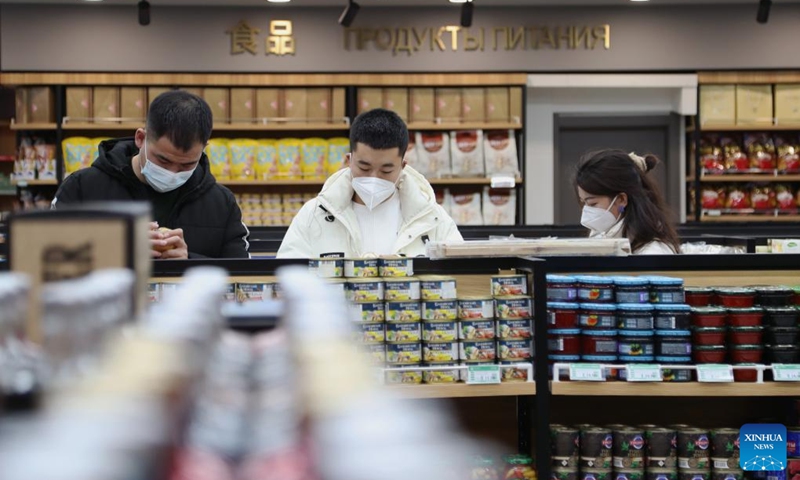
People shop at a Russian goods store in Manzhouli, north China's Inner Mongolia Autonomous Region, March 16, 2023. (Xinhua/Wang Kaiyan)
As trade and economic ties between China and Russia are expected to deepen, the yuan will gain appeal among Russian firms, at a time when the Russian economy is restricted from Western financial networks.
Ozon Holding, one of Russia's largest online retailers, is doubling down on the Chinese currency to fend off increasing external uncertainty.
With more e-commerce businesses from China flourishing in Russia, the yuan will be more broadly used.
Simon Huang, managing director of Ozon China, told the Global Times in a recent interview that "this year, we are actively promoting settlement in the yuan for Chinese cross-border sellers on our platform. From commodity pricing to payment, the process is centered on the yuan to reduce the risk of exchange-rate fluctuations."
Huang said that it serves an important factor for the platform to ensure the safety and stability of the supply chain.
Top Chinese officials have said that both sides need to strengthen overall coordination and boost trade in traditional areas such as energy and resources, while continuously enhancing the resilience of industrial and supply chains. Efforts in facilitating cross-border logistics and transportation should be ramped up as well.
Ozon said in November last year that it would open an office in Shenzhen, South China's Guangdong Province, to boost cross-border sales to Russian shoppers on its platform.
By year-end, the number of Chinese sellers on the platform had grown by 2.5 times year-on-year. In 2023, the increase in Chinese sellers became much faster.
The platform aims to have about 100,000 cumulative active Chinese sellers by the end of 2024.
E-commerce has become an important part of China-Russia bilateral economic and trade cooperation, which hit a record high of 1.28 trillion yuan ($190 billion) last year, as Chinese customs data showed.
Given the growing momentum, Huang said that e-commerce's share of bilateral trade will grow further in the years to come, driving up the use of the yuan in Russia.
The popularity of the yuan in Russia is mainly due to the adjustment of Russia's own policies and continuous development of China-Russia economic and trade cooperation.
More importantly, the sustained and stable growth of the Chinese economy has laid a solid foundation for the internationalization of the yuan, experts said.
The stable exchange rate of the yuan contributes to its appeal in terms of risk aversion, amid tightening of the US Federal Reserve's monetary policy and the conflict between Russia and Ukraine.
The Russian top leader is also throwing his weight behind the globalization of the yuan, while ditching the clout of the US dollar in the country.
"We are for the use of the Chinese yuan in settlements between Russia and Asian countries, Africa, Latin America… This practice should be further encouraged," Russian President Vladimir Putin said earlier this month, according to the RIA Novosti news service.
According to data released by the Moscow Exchange in early March, the exchange's trading volume in yuan during February increased by nearly one-third to 1.48 trillion rubles ($130 billion), while US dollar trading volume only increased by 8 percent to 1.42 trillion rubles.
For the first time, the yuan surpassed the dollar in trading volume on the exchange.
Russia's Finance Ministry said at the end of last year that the maximum possible share of the yuan in its National Wealth Fund had doubled to 60 percent as it restructured the fund to reduce dependency on other currencies.




